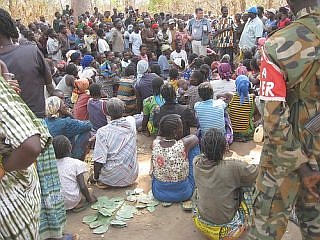Africa's Internally Displaced Persons: The Untold Story
Perhaps I should start by addressing the title. Internally displaced persons (IDPs) are people forced to flee their homes but who, unlike refugees, remain within their country's borders. While refugees are eligible to receive international protection and help under the 1951 Refugee Convention and the 1967 Protocol, the international community is not under the same legal obligation to protect and assist the IDPs.
 |
| UNDP meets IDPs in Sudan Photo courtesy |
IDMC estimates that there are 26 million IDPs around the world. Of this figure, nearly 17 million IDPs are in Africa. The statistics are bad enough; what makes it worse however, is the fact that these are not just figures; they are human beings. It is hard imagining their daily routine while sitting in front of my computer.
What is shocking is the fact that the African Union (AU) and its discarded predecessor, the Organisation of African Unity (OAU) never bothered to address this issue for their combined 46 years of existence. It is still unknown as to what triggered the AU to finally bring the issue on the agenda and decided to call a convention on the IDPs, which took place in Kampala, Uganda, on 23rd October 2009.
Under the convention, African governments will have to look after their displaced citizens. Politicians who chase civilians out of their homes will be liable for prosecution by their domestic courts. The convention takes a strong stand against armed rebel groups, which can now also be held responsible for uprooting civilians. It calls for more assistance for women and other vulnerable people.
This looks good and promising, but it sounds like we have been here before and experience may remind us that promises may be a fool’s comfort. Indeed, according to the Economist, the only serious current affairs publication to report on the convention, the Ugandan president, Yoweri Museveni has described this as a "start." Arguing: "a piece of paper would not bring immediate relief to displaced women in Darfur."
While I think this is a right observation by Museveni, I am cynical about the connotations of his statement, especially that Museveni himself may be reliable for persecution for his failure to protect an estimated 2 million of his people displaced by the Lord’s Resistance Army in northern Uganda; and this forms one of the criticism that has been levelled against the staging of the convention in Uganda.
Apart from the issues of finance and the fact that the convention has been pioneered by people that may be liable for persecution, the major challenge to the implementation of the ideals of the convention will be provided by Sudan. The Khartoum government has not signed the treaty yet Sudan has the largest number of IDPs in the world, just over 5 Million.
While I am aware that the displacements can be caused by natural disasters, and figures presented here certainly include such cases, the displacement of people that has taken place in Kenya and Zimbabwe for example, are truly despicable and I think AU must share the blame given that the perpetrators are still free. Indeed Robert Mugabe was one of the delegates to the convention.
It may look like the Africa has a mountain to climb, but with dedication and togetherness, these issues can be addressed once and for all. Let us take the example of Mozambique. The statistics indicate that Mozambique has no IDPs, yet Mozambique has emerged from a 16 year civil war in the last decade or so.
While the debate and the finger pointing goes on, the IDPs, who are nearly the same as the entire population of Ghana, are still living nowhere; without food, shelter, health care, clothing and they do any have any form of protection.
Where does all this leave Africa? Can the continent really develop, economically, politically and culturally with the IDPs in its midst? AU and African leaders must remember that it is not only the plight of the IDPs at stake but the continent and most importantly, future generations.
By Jimmy Kainja,
Jimmy hails from Malawi but is currently pursuing a Masters of Research (MRes) degree in Media and Communications at London Metropolitan University.
